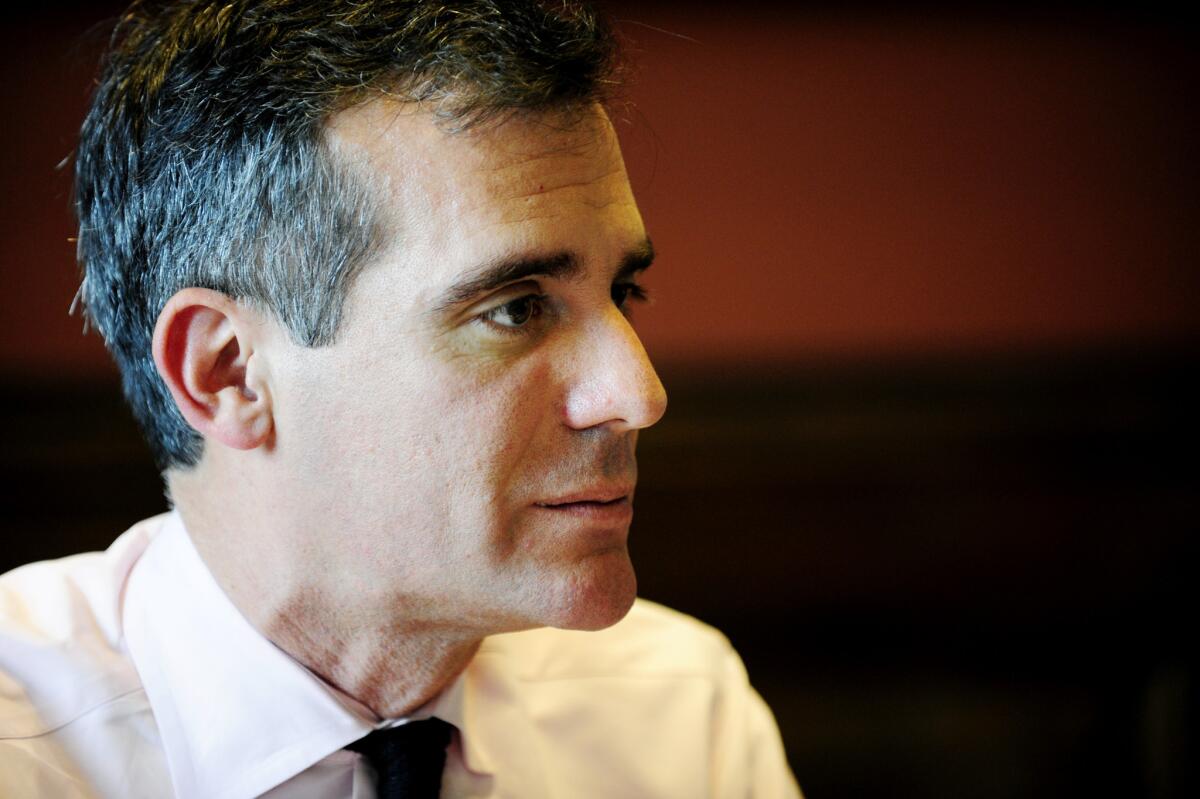Costly perk forces DWP to shell out extra if it gives work to outside contractors

It’s no secret Los Angeles Department of Water and Power employees are paid well. But a little-known clause in their union contract ensures they can work extra hours and collect even higher wages when private contractors are hired to help them get the job done.
The so-called “outsourcing bonus” traces back to a single sentence inserted into the city-owned utility’s labor contract nearly two decades ago. Intended partly to discourage use of private companies with lower labor costs, the contract provision requires DWP managers to offer overtime to any employee who could have performed tasks assigned to a contractor — such as engineering, construction or clerical work.
![]() The requirement is one of several obscure work rules that newly elected Mayor Eric Garcetti is pushing to reexamine as part of a new DWP labor agreement, and to fulfill a campaign pledge to reform the agency that provides power and electricity to millions of Los Angeles homes and businesses.
The requirement is one of several obscure work rules that newly elected Mayor Eric Garcetti is pushing to reexamine as part of a new DWP labor agreement, and to fulfill a campaign pledge to reform the agency that provides power and electricity to millions of Los Angeles homes and businesses.
No other city union contract has a similar overtime provision, according to the city’s top budget analyst. And eliminating the bonus could save up to $20 million over the life of a four-year labor pact now being considered by city leaders, DWP executives told The Times this week.
Last month, The Times reported that a separate decades-old provision, included in the DWP’s disability plan, required the agency to pay employees unlimited, extra sick days. That program cost ratepayers $35.5 million since 2010. DWP officials could find no medical justification for more than half of the employees who took more than a month of extra sick days.”These policies make no sense and are another reason why we must reform” the agency, Garcetti told The Times. Late Thursday, he said he would not sign the proposed DWP labor contract because it limits reforms to “the department’s costly and inefficient work rules.”
DWP officials downplayed the financial effects of the overtime bonus, saying there is always plenty of work for their employees to do. “We believe this requirement isn’t causing a lot of overtime that wouldn’t need to be incurred anyway,” said Philip Leiber, the DWP’s chief financial officer.
But Marick F. Masters, a business professor at Wayne State University in Detroit, and a nationally recognized expert on labor management relations, said he had not heard of a union contract that included such bonuses.
In the private sector, he added, “when you talk about outsourcing, you’re talking about ripping the whole job out from underneath you. You may get to stick around for a while to train the person that replaces you, that’s the best it gets.”
A consultant hired last year by the City Council to review proposed DWP rate hikes flagged the overtime mandate as a serious obstacle to controlling expenses at the department.
The requirement prevents the agency “from outsourcing effectively by essentially increasing the cost of doing so ... and depriving management of an effective tool that can be used to promote efficiency,” concluded the report by Los Angeles-based PA Consulting.
DWP employee compensation emerged as a central issue in the mayoral campaign earlier this year after the utility’s largest union spent millions in support of Garcetti’s chief opponent Wendy Greuel, becoming her biggest financial backer.
Controversy around the agency and its compensation policies has continued since Garcetti’s victory, as city leaders debate a new four-year labor agreement. Garcetti has said more concessions are needed on work rules, and pension and healthcare costs.
Brian D’Arcy, the leader of the DWP union, did not respond to requests for comment.
Several council members have expressed support for the proposed labor agreement now on the table. City analysts say it would save $500 million over the next four years, and several billion dollars in the coming decades. City Council President Herb Wesson convened a public hearing on the new contract beginning Friday morning.
In the background of the debate are DWP rate increases, which totaled 11% over the last two years for electricity. More increases, partly to pay for cleaner energy projects also are being discussed.
The utility’s nearly 10,000 employees averaged more than $100,000 in salary, overtime and other payments last year and made roughly 50% more than other city workers, a Times review found. A city study last year concluded DWP workers make roughly 25% more than employees at comparable utilities.
On Thursday, City Controller Ron Galperin released a new study showing 58% of the utility’s employees made in excess of $50,000 during the first six months of 2013,compared to 33% percent of employees at the police and fire departments. In addition to the outsourcing bonus, Galperin found 616 categories of extra compensation in DWP pay records that can boost base salaries, including hazard pay, meal reimbursements and a bonus for working in inclement weather.
Use of overtime has increased at the agency, according to DWP General Manager Ron Nichols, because workers are replacing aging infrastructure and completing projects needed to meet regulatory requirements. The agency also has been slow to replace approximately 500 employees who retire each year, Nichols said.
“Paying [overtime] is often less expensive than hiring new full-time staff,” he said. “The department is simply unable to hire quickly enough to get the staff we need.’’
Under the outsourcing bonus program, employees who do the type of work performed by hired contractors must be offered at least 10% additional hours, as overtime, for as long as the outside contractors are on the job. In most cases DWP employees get 150% of their regular salary, but can collect 200% if the overtime falls on a Sunday or a holiday.
Agency officials said accurate numbers on the cost of the policy to ratepayers are not available. That’s partly because most agency records don’t distinguish between overtime worked in the normal course of business and overtime offered to employees as a result of the outsourcing bonus policy.
The DWP’s estimate of up to $20 million in potential savings was “based on a review of overtime expenditures over the last few years,” Assistant Chief Legislative Analyst Sharon Tso told The Times in an email. It’s not clear what, if any, additional operational savings might be realized if the disincentive to use outside workers was removed.
One element of the proposed new DWP labor contract would reduce the outsourcing bonus from 10% to 5% for a limited number of DWP employees, such as clerks and their supervisors — about 1,600 in all. That change could save an estimated $3 million over four years, according to the DWP’s Leiber. Though records on the overall financial effects of the overtime bonus program weren’t available, a Times public records request turned up logs for a few smaller DWP units with names of employees who accepted the extra hours last year.
Some of those employees were among the DWP’s biggest overtime earners in 2012, records show, although it wasn’t clear how much of their extra pay was a result of the outsourcing policy.
One welder with a base pay of $99,619 collected an additional $91,614 in overtime, DWP payroll records show. With $4,494 in un-itemized “other” payments, his total pay for the year was $195,729. Another welder received $87,626 in overtime pay, on top of his $94,812 base pay. Neither could be reached for comment.
jack.dolan@latimes.com
Times staff writer Catherine Saillant contributed to this report.
More to Read
Sign up for Essential California
The most important California stories and recommendations in your inbox every morning.
You may occasionally receive promotional content from the Los Angeles Times.











